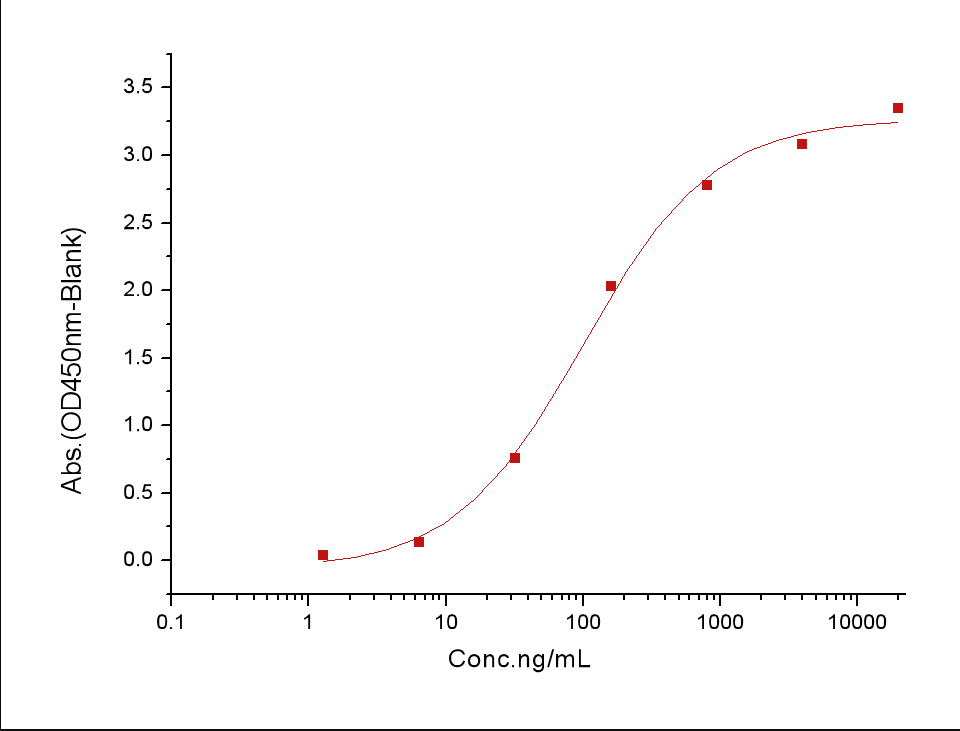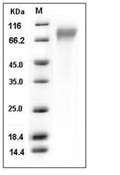Shopping Cart
- Remove All
 Your shopping cart is currently empty
Your shopping cart is currently empty

CD30/TNFRSF8 Protein, Human, Recombinant (His) is expressed in HEK293 mammalian cells with His tag. The predicted molecular weight is 40 kDa and the accession number is P28908-1.

| Pack Size | Price | Availability | Quantity |
|---|---|---|---|
| 100 μg | $255 | In Stock | |
| 200 μg | $451 | 7-10 days |
| Biological Activity | Immobilized Human CD30L hFc at 2 μg/mL (100 μL/well) can bind Human CD30/TNFRSF8 His, the EC50 of Human CD30/TNFRSF8 His is 30-180 ng/mL.  |
| Description | CD30/TNFRSF8 Protein, Human, Recombinant (His) is expressed in HEK293 mammalian cells with His tag. The predicted molecular weight is 40 kDa and the accession number is P28908-1. |
| Species | Human |
| Expression System | HEK293 Cells |
| Tag | C-His |
| Accession Number | P28908-1 |
| Synonyms | tumor necrosis factor receptor superfamily, member 8,Ki-1,D1S166E,CD30 |
| Construction | A DNA sequence encoding the human TNFRSF8 (NP_001234.2) extracellular domain (Met 1-Lys 379) was expressed, fused with a polyhistidine tag at the C-terminus. Predicted N terminal: Phe 19 |
| Protein Purity | > 95 % as determined by SDS-PAGE  |
| Molecular Weight | 40 kDa (predicted); 75-90 kDa (reducing condition, due to glycosylation) |
| Endotoxin | < 1.0 EU/μg of the protein as determined by the LAL method. |
| Formulation | Lyophilized from a solution filtered through a 0.22 μm filter, containing PBS, pH 7.4. Typically, a mixture containing 5% to 8% trehalose, mannitol, and 0.01% Tween 80 is incorporated as a protective agent before lyophilization. |
| Reconstitution | A Certificate of Analysis (CoA) containing reconstitution instructions is included with the products. Please refer to the CoA for detailed information. |
| Stability & Storage | It is recommended to store recombinant proteins at -20°C to -80°C for future use. Lyophilized powders can be stably stored for over 12 months, while liquid products can be stored for 6-12 months at -80°C. For reconstituted protein solutions, the solution can be stored at -20°C to -80°C for at least 3 months. Please avoid multiple freeze-thaw cycles and store products in aliquots. |
| Shipping | In general, Lyophilized powders are shipping with blue ice. |
| Research Background | CD30, also known as TNFRSF8, is a cell membrane protein of the tumor necrosis factor receptor (TNFR) superfamily. CD30 protein is expressed by activated, but not resting, T and B cells. CD30 can regulate proliferation of lymphocytes and may also play an important role in human immunodeficiency virus replication. As a regulator of apoptosis, CD30 protein induces cell death or proliferation, depending on the cell type, and has been shown to limit the proliferative potential of autoreactive CD8 effector T cells and protect the body against autoimmunity. CD30 protein expression is upregulated in various hematological malignancies, including Reed-Sternberg cells in Hodgkin's disease (HD), anaplastic large cell lymphoma (ALCL) and subsets of Non-Hodgkin's lymphomas (NHLs), and CD30 is also linked to leukocytes in patients with chronic inflammatory diseases, including lupus erythematosus, asthma, rheumatoid arthritis and atopic dermatitis (AD).Cancer ImmunotherapyImmune CheckpointImmunotherapyTargeted Therapy |

Copyright © 2015-2025 TargetMol Chemicals Inc. All Rights Reserved.